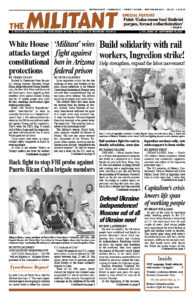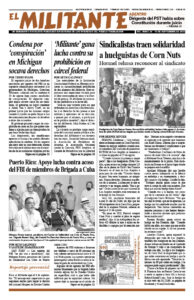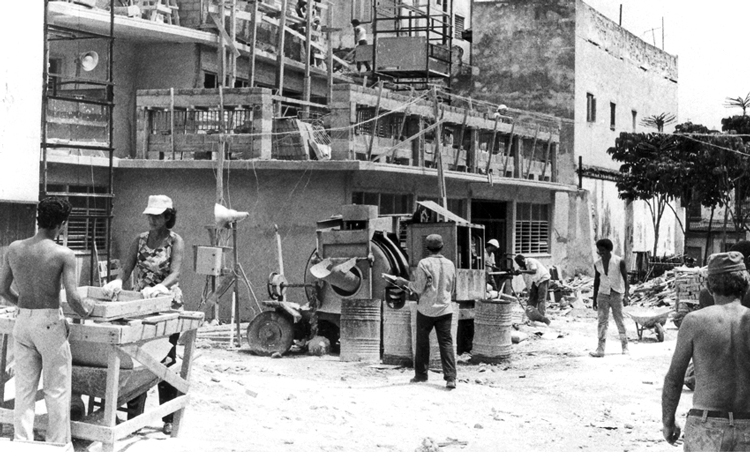This week — following the death of former Soviet President Mikhail Gorbachev — we are featuring excerpts from Fidel Castro that help explain the course adopted by Cuba’s Marxist leadership to rectify problems in advancing the socialist revolution, as contrasted to the course of the Stalinist regime in the Soviet Union. The first excerpt is from “Important Problems for the Whole of International Revolutionary Thought,” the Dec. 2, 1986, speech Castro gave to close the Cuban Communist Party’s Third Congress taken from New International magazine no. 6. Copyright © 1987. Reprinted by permission.
Castro explains the rectification process, decided by the party, to make a historic political correction in the course of the revolution. Evidence was mounting, Castro said, that the direction they had been heading was not toward socialism and communism, but “to a system worse than capitalism.”
The second and third excerpts are from Castro’s March 1990 trip to Brazil where he was asked repeatedly whether Cuba would follow Gorbachev’s policies of “glasnost” and “perestroika.” One is from Castro’s exchange with revolutionary-minded religious figures in Sao Paulo March 17. Translation from the Portuguese is by the Militant. The other is from the March 23 Excelsior, a Mexican daily. Less than two years later, the Soviet Union imploded.
BY FIDEL CASTRO
We always saw that the masses were the basic factor in the revolutionary struggle, the great force that makes history. … [T]hey are under the leadership of the party, because the Leninist idea of the role of the party in a revolutionary process is becoming clearer and clearer. … The party, its members, its cadres are very moral and humane.
It was starting to go to pot, but we have reacted in plenty of time so that the party members will not be corrupted, the party will not be corrupted, the young people will not be corrupted, and above all our working class will not be corrupted. … I’m expressing what we have been seeing in this rectification process. …
We had to rectify the [kinds of errors we were making] in time, not only for the sake of our own process but also for the revolutionary process in general, since the construction of a new society, the construction of socialism, the road to communism is completely new to humanity. …
I’ve seen the examples of what was happening to us; the blind belief — or it began to be blind — that the construction of socialism is basically a question of mechanisms. … I think that the construction of socialism and communism is essentially a political task and a revolutionary task, it must be fundamentally the fruit of the development of an awareness and educating people for socialism and communism. [Applause]
* * *
Before they talked about perestroika in the Soviet Union, we had already begun a process of rectification of errors and negative tendencies. Of course, our process couldn’t be the same as that of the Soviet Union, because we didn’t make the same mistakes they made. We made mistakes of a different kind and we had to rectify them. … In our country we didn’t have developments like those resulting from Stalinism — that never occurred — neither the abuses of power, nor the very negative, violent actions against people that took place at certain moments of history there.
We’ve never used violence against a single citizen. We would never stoop to doing that, because the day we did such a thing — using methods of torture and committing crimes — we’d feel outraged. … Great abuses of power took place at certain times in the USSR, and other developments that did not happen in Cuba. …
Certain other things happened here [in Cuba]. One was that, despite the uniqueness that has always characterized our revolution, there were some things we copied from them. One of the things we’ve addressed through our process of rectification are methods we copied from them that did not produce good results in our country. … We are correcting errors; we really don’t like to use capitalist categories in constructing socialism while they, on the other hand, are increasingly introducing capitalist categories. … We’ve also been careful to avoid as much as possible privileges among our leaders, officials, cadres. We struggle against that, but above all, we’ve made a big effort to maintain the unity between our party and our people, between the revolution and the people. Because what happened in several of these countries was a divorce between the party and the people, between the government and the people. If we made such errors we wouldn’t last a moment in face of the United States, a powerful country that blockades us, pressures us, harasses us, wants to destroy us. Without a united, organized, and armed people to defend the revolution, we wouldn’t be able to exist next to the United States. So reality shows that we haven’t made those types of errors. …
Does it seem like the easiest thing in the world to make a revolution 90 miles away from the United States and resist for over 30 years the imperialist blockade, the hostility, the slander, the war against us, the permanent threats, which have forced us to invest so many resources and so much energy, and make so many sacrifices? Who was going to save socialism in Cuba, the Soviet tanks? The Soviets were over there, far away from us, they couldn’t have arrived in Cuba in time. The tanks that can come rapidly to Cuba are the U.S. tanks, do you understand? That actually helped us a lot.
Instead of saying, what a misfortune it is living so close to the United States, I can say, what a good fortune to have lived so far away from the borders of the Soviet Union. It never occurred to us to trust that the Soviets would come to save our revolution, had we divorced ourselves from the masses and the people and started to make all sorts of mistakes. [W]hat good fortune that was, because any revolution that is unable to defend itself is a revolution not worth saving. What good is any revolution that must depend on others to save it?
* * *
We never experienced Stalinist phenomena in Cuba. There was no purge in Cuba. We did not have one single political prisoner, disappeared or tortured person. We did not conduct a forceful collectivization of agriculture as was the case in Eastern Europe. People used to criticize us, saying we were a satellite of the USSR. Now we are criticized for not doing what the Soviets are doing. … To explain all this, it is necessary to go back to Che Guevara’s times. Che Guevara used to say that socialism cannot be built based on capitalistic ideas such as benefit and profit. Che was a prophet who saw all things very clearly.


